Jim Carnes: Congress’ plan to cut Medicaid threatens Alabama’s rural communities

In many small towns across Alabama, the Great Recession of 2008 is still visible in empty storefronts, shrunken paychecks and lives put on hold. Unfortunately, those rural communities will soon be dealt another devastating blow if Congress cuts federal funding for our state’s Medicaid program. Medicaid is a critical lifeline for 24 percent of Alabama’s rural and small-town residents, and the deep cuts to Medicaid being considered right now by Congress would have a harmful and disproportionate impact on our children, seniors and families in need. According to a new independent report by researchers at Georgetown University and the University of North Carolina, a larger share of children and families living in small towns and rural areas rely on Medicaid for their health coverage. This is especially true for children. About 52 percent of children living in non-metro areas of Alabama are covered by Medicaid and ALLKids (known in other states as the Children’s Health Insurance Program, or CHIP), compared to 42 percent in metro areas. Nationally, the researchers found a direct connection between increases in Medicaid and CHIP coverage and reductions in the rate of uninsured children in small towns and rural areas. For almost 20 years, ALLKids has been a point of pride for Alabama. Our CHIP program was the first to be authorized when federal law made the coverage possible, and ours has been a national leader in quality and reach. We can’t afford to turn our backs now on the progress we’ve made for our kids. Studies show that when children have health coverage they can get important doctor-recommended screenings and care to help them stay healthy and are more likely to enter school ready to learn. The study also found that Medicaid covers a higher percentage of adults living in small towns and rural areas (14 percent) than in our state’s metro areas (11 percent). Many adults covered by Medicaid are parents or caregivers, and when they have health care coverage, they are better able to provide children with the care they need to grow and thrive. Medicaid also helps improve financial security by protecting the entire family against medical debt and bankruptcy. Alabama’s rural seniors also depend more heavily on Medicaid coverage (24 percent) than their peers in urban areas (19 percent). The proposed cuts would fall especially hard on Alabama’s small-town nursing homes and other long-term care services. Even Alabama residents who aren’t directly covered by Medicaid should be concerned about what cuts to Medicaid would mean for hospitals, clinics and physicians serving our state’s small towns and rural communities. When fewer people are covered, ER visits and uncompensated care drive up costs for all of us and put rural hospitals and doctors’ offices at risk of closing their doors. When a community hospital closes, the entire community suffers. Medicaid is a lifeline for the rural parts of our state. It ensures that the most vulnerable among us–children, seniors and people with disabilities – can get the care they need. It keeps our rural hospitals running and able to serve patients who otherwise would be forced to drive long distances to get care. City dwellers sometimes forget that rural health care can be a life-saver for any traveler who has a highway emergency. Medicaid cuts are bad for Alabama. They won’t rein in personal health care costs. They won’t give our state flexibility to innovate and find better ways to deliver care. Instead, they will take away coverage from those who need it most and undermine the healthcare infrastructure on which we all depend. ••• Jim Carnes is policy director for Arise Citizens’ Policy Project, a statewide nonprofit coalition of 150 congregations and organizations working to improve public policies that affect low-income Alabamians.
Daniel Sutter: Just what the doctor ordered

The U.S. House of Representatives recently passed the American Health Care Act (AHCA), an expansive bill which Republicans claim delivers on their promise to repeal and replace the Affordable Care Act. The AHCA proposes changes to Medicaid that should control costs, and could even improve the quality of care for low income Americans. Medicaid is the joint state and Federal program providing health insurance for the poor and disabled. States operate the programs, with rules and over half of the funding provided by Washington. Since Medicaid’s founding in 1965, matching grants have doled out Federal dollars, with states receiving from $1 to $3 for each dollar spent (low income states get a better match). Beginning in 2020 under the AHCA, states would receive a fixed dollar amount per beneficiary, for each of five beneficiary categories. Alternatively, states could elect to receive a block grant, meaning a fixed dollar amount not dependent on the number of enrollees. Medicaid’s match has been open-ended, so that spending more on approved coverage brings in more Federal dollars. High income states have obtained more Federal dollars through generous optional coverage. But this means that for any total of Federal spending, fewer dollars are available to help poor states, compromising the quality of care. Matching grants have also produced billions of dollars of spending on services that Americans do not think are worthwhile. This last point requires some explanation. People obviously do not agree on how much we should spend on Medicaid (or any program). Labeling spending “wasteful” often simply disguises personal opinion. I think that some Medicaid spending can be more validly called wasteful. Suppose that a state considers spending $100 million on Medicaid. Given Alabama’s matching rate, our state legislators would need to appropriate about $35 million to cover $100 million of services. Is this spending worthwhile? Most Alabamians are not on Medicaid, so if we think solely in terms of personal benefit, most of us would say no. But Americans give almost $400 billion annually to charity, and so clearly consider the well-being of others. We would need to think about how much we value providing medical care for those who can’t afford it. The thinking resembles deliberating about individually donating $100 to a charity; if we give the money, we effectively say that helping others is worth at least $100. For the Medicaid example, Alabamians should consider exactly what procedures and persons will be covered, and whether we can afford the taxes. Let’s say we do this and come up with a value. If the value is at least $100 million, the spending is worthwhile. Unfortunately, Medicaid’s matching grants encourage Alabamians to only worry if the services are worth the $35 million we must spend. Yes, we pay a share of Federal taxes, but separately from decisions about Medicaid. So we might approve spending which we believe yields only $50 million in value. Spending $100 million to produce $50 million in value, I think, counts as waste. Block grants make states pay the full cost of extra spending. Consequently, Alabama and other states should only spend $100 million on Medicaid when the perceived value is at least $100 million. The Congressional Budget Office estimates that the ACHA will reduce Medicaid spending by $880 billion over a decade. Would this eviscerate Medicaid? Spending today exceeds $500 billion annually, and is projected to rise, so we will still be spending roughly half a trillion dollars a year. More importantly, the cuts should target coverage that Americans judge to not be worth the cost. No state would be compelled to cut coverage for any person currently on Medicaid. The first lesson of economics is that incentives matter. Medicaid’s open-ended matching grants create bad incentives under which states waste our tax dollars. The AHCA is a broad bill, and some elements may do more harm than good. But ending Medicaid matching grants would be a prescription for improvement. ••• Daniel Sutter is the Charles G. Koch Professor of Economics with the Manuel H. Johnson Center for Political Economy at Troy University and host of Econversations on TrojanVision. The opinions expressed in this column are the author’s and do not necessarily reflect the views of Troy University.
Wisconsin seeks to be first state to drug test Medicaid applicants
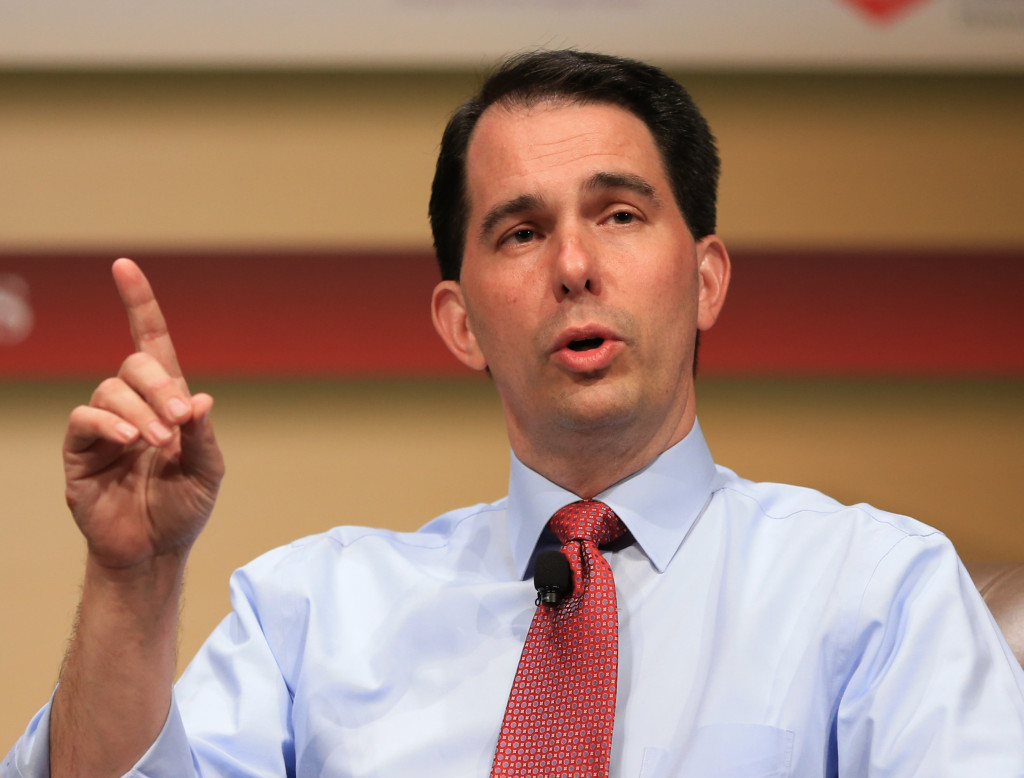
Gov. Scott Walker wants to make Wisconsin the first state in the country to require childless adults applying for Medicaid to undergo drug screening, a move that could serve as a national model. Walker’s plan, which needs federal approval, comes as he prepares to run for a third term next year. Wisconsin’s Republican-controlled Legislature approved Walker’s request for a waiver to do the drug tests two years ago, but is now digging into the details of how it would actually work. The Legislature’s budget-writing Joint Finance Committee was to review a wide range of Walker’s welfare reform proposals Thursday, including imposing a new work requirement on childless adult Medicaid recipients and parents who receive food stamps. The committee could vote to give the Legislature more oversight of the programs or make changes to what Walker wants. Walker has talked for years about drug testing Medicaid and food stamp recipients, touting it as a way to make welfare programs a “trampoline, not a hammock” to get people back into the workforce. A requirement that childless adults receiving food stamps be screened for drugs was passed in the prior state budget, but it’s yet to take effect pending federal approval. Former President Barack Obama‘s administration warned Wisconsin at the time the requirement was passed that it was barred under federal law. But Walker’s drug-testing and work-requirement plans to take effect in 2019 would be more likely to get approval from Republican President Donald Trump‘s administration. The drug test requirement was also widely expected to be challenged in court. “I do think that there’s a good chance Wisconsin would be the first state to get such a waiver and it could indeed set a trend,” said Jon Peacock, research director of the Wisconsin Council on Children and Families. Fourteen other states have some type of drug screening or test as part of their public benefits programs, according to the National Conference of State Legislatures. Wisconsin is seeking to become the first to require it as a condition of eligibility for the Medicaid program. Peacock and other critics say drug testing Medicaid applicants is the wrong approach. “It would be an extremely negative development because it treats drug addiction as a moral failing rather than a disease,” Peacock said. “It says that we’re going to test people first as a condition of getting access to health care, which is backwards. We need to get people into health care programs, build trust with their doctors and then get them the treatment they need.” Opponents, including minority Democrats who don’t have the votes to stop it, also say the provision will likely be declared unconstitutional, won’t achieve the stated goals of keeping people drug-free and will only create another hurdle for Medicaid recipients to receive benefits. The new drug test requirement would affect about 148,000 of the 1.2 million people in BadgerCare, the state’s main Medicaid program. It provides benefits to people who earn less than $12,060 a year as a single adult and $16,240 a year for a couple. Those who refuse a drug test would be ineligible for coverage until the test is completed, while people who test positive would get treatment paid for by taxpayers through the Medicaid program. Details about the type of treatment and where it would be offered would be worked out with the federal government as the plan is implemented. Those who refuse treatment would lose benefits for six months. Walker’s federal waiver request was to include a host of other changes, including limiting childless adult eligibility for Medicaid to no more than four years if they aren’t meeting work requirements, imposing new monthly premiums and charging more for those who smoke or engage in other unhealthy behavior. Republished with permission of The Associated Press.
Donald Trump’s health care budget means deep cuts for safety net
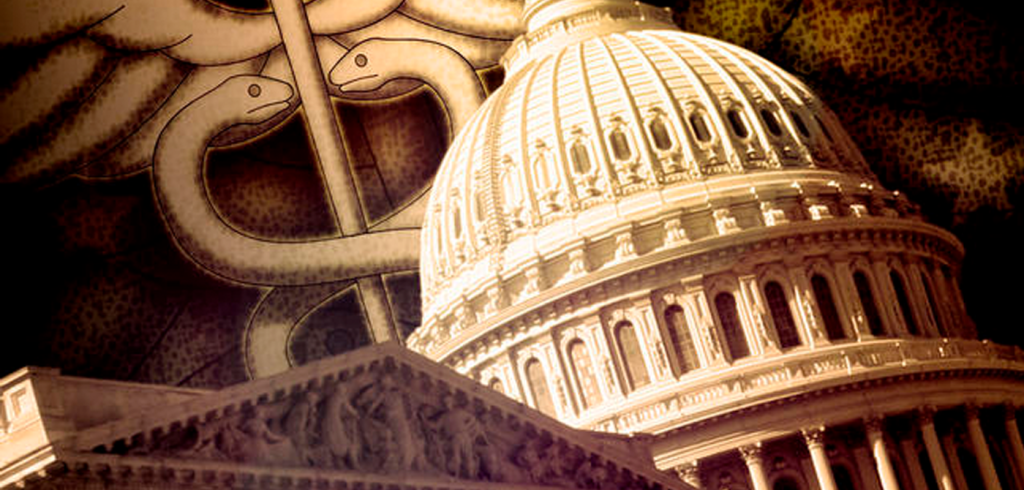
Candidate Donald Trump promised to improve health care, but as president his first full budget calls for deep cuts to popular insurance programs. And it omits any proposal for negotiating prescription drug prices, a Trump talking point. While not addressing Medicare’s long term financial problems, the budget targets the much smaller Children’s Health Insurance Program, or CHIP. And Trump’s Medicaid cuts appear even bigger than those in the health care bill recently passed by House Republicans, above what would be needed to fulfill the GOP vow to repeal “Obamacare.” Both safety net programs are federal-state collaborations, and such cuts would leave states with hard choices: spend more of their own money; restrict enrollment; cut benefits, or reduce payments to hospitals and doctors. “If states get fewer dollars from the federal government, there are only so many options, because states have to balance the budget every year,” said Elizabeth Carpenter, a health policy expert with the consulting firm Avalare Health. Trump’s budget was silent on bargaining with the pharmaceutical industry to reduce the cost of prescription drugs, a topic the president has often touched on. But the budget repeated Trump’s previous proposals for double-digit percentage cuts to the National Institutes of Health and the Centers for Disease Control and Prevention, considered nonstarters even by Republican lawmakers. The trillion-dollar-plus Department of Health and Human Services, whose programs cover more than 130 million people, did not hold its customary budget briefing on Tuesday. From Europe where he is attending a world health conference, HHS Secretary Tom Price released a statement that said the budget “outlines a clear path toward fiscal responsibility by creating efficiencies that both improve services and save money.” As a candidate and as president Trump has frequently talked about making health care more affordable for regular folks, including by lowering premiums and deductibles. He promised not to cut Medicare, and initially, Medicaid as well. But to some experts, Trump’s budget looks more like a cost shift from the federal government to the states and to people now benefiting from coverage expansions in the Obama years. “I think it will be challenging for states to try to figure out what to do,” said Trish Riley, executive director of the nonpartisan National Academy for State Health Policy, which advises states. Children’s health insurance previously had not figured as a major issue for the administration. The CHIP program covers about 7 million children, and traditionally enjoyed bipartisan support. Trump’s budget would extend CHIP for another two years, but it would also cut $5.8 billion. “It’s a big impact,” said Riley. States would receive significantly lower overall payments from the federal government, and Washington would no longer match state spending on coverage for kids whose families make more than two-and-a-half times the federal poverty level, about $51,000 for a family of three. More than half the states now cover children above the administration’s proposed cutoff, Riley said. Administration officials say that the limitation proposed in the budget would focus taxpayer money on families who need it the most. Medicaid is facing even bigger cuts. Already, the House GOP bill would roll back former President Barack Obama‘s Medicaid expansion while also capping future federal financing for the program. The Congressional Budget Office estimates that would reduce federal Medicaid spending by $839 billion over 10 years. Trump’s budget would squeeze additional savings beyond that, but congressional aides say how much is not exactly clear. White House Budget Director Mick Mulvaney has indicated that the budget uses a lower growth rate for the federal government’s share of future Medicaid spending. “The Trump budget assumes hundreds of billions more in Medicaid cuts than the House bill,” said Edwin Park, a health policy expert with the Center on Budget and Policy Priorities, which advocates for low-income people. Republished with permission of The Associated Press.
White House, in gamble, demands make-or-break health vote
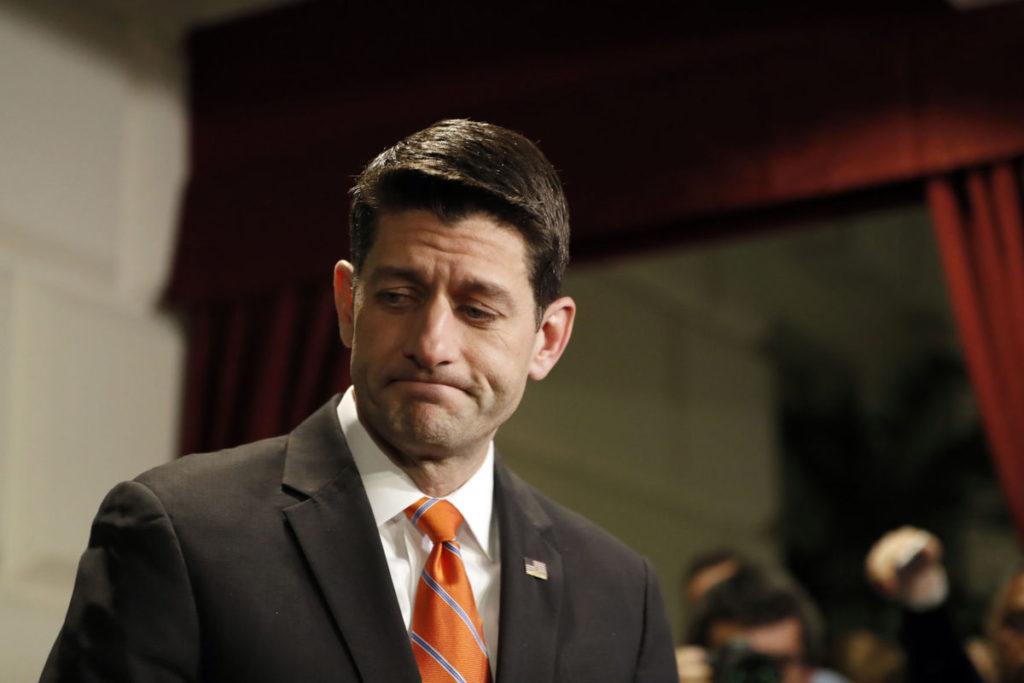
Abandoning negotiations, President Donald Trump demanded a make-or-break vote on health care legislation in the House, threatening to leave “Obamacare” in place and move on to other issues if Friday’s vote fails. The risky move, part gamble and part threat, was presented to GOP lawmakers behind closed doors Thursday night after a long and intense day that saw a planned vote on the health care bill scrapped as the legislation remained short of votes amid cascading negotiations among conservative lawmakers, moderates and others. At the end of it the president had had enough and was ready to vote and move on, whatever the result, Trump’s budget director Mick Mulvaney told lawmakers. “‘Negotiations are over, we’d like to vote tomorrow and let’s get this done for the American people.’ That was it,” Rep. Duncan Hunter of California said as he left the meeting, summarizing Mulvaney’s message to lawmakers. “Let’s vote,” White House chief strategist Steve Bannon said as he walked out. “For seven and a half years we have been promising the American people that we will repeal and replace this broken law because it’s collapsing and it’s failing families, and tomorrow we’re proceeding,” House Speaker Paul Ryan said, then walked off without answering as reporters demanded to know whether the bill had the votes to pass. The outcome of Friday’s vote was impossible to predict. Both conservative and moderate lawmakers had claimed the bill lacked votes after a long day of talks. But the White House appeared ready to gamble that the prospect of failing to repeal former President Barack Obama‘s health law, after seven years of promising to do exactly that, would force lawmakers into the “yes” column. “It’s done tomorrow. Or ‘Obamacare’ stays,” said Rep. Chris Collins, R-N.Y., a top Trump ally in the House. Collins was among those predicting success Friday, but others didn’t hide their anxiety about the outcome. Asked whether Republicans would be unified on Friday’s vote, freshman Rep Matt Gaetz of Florida said, “I sure hope so, or we’ll have the opportunity to watch a unified Democratic caucus impeach Donald Trump in two years when we lose the majority.” Thursday’s maneuvers added up to high drama on Capitol Hill, but Friday promised even more suspense with the prospect of leadership putting a major bill on the floor uncertain about whether it would pass or fail. The Republican legislation would halt Obama’s tax penalties against people who don’t buy coverage and cut the federal-state Medicaid program for low earners, which the Obama statute had expanded. It would provide tax credits to help people pay medical bills, though generally skimpier than Obama’s statute provides. It also would allow insurers to charge older Americans more and repeal tax boosts the law imposed on high-income people and health industry companies. The measure would also block federal payments to Planned Parenthood for a year, another stumbling block for GOP moderates. In a concession to the conservative House Freedom Caucus, many of whose members have withheld support, the legislation would repeal requirements for insurers to cover “essential health benefits” such as maternity care and substance abuse treatment. The drama unfolded seven years to the day after Obama signed his landmark law, an anniversary GOP leaders meant to celebrate with a vote to undo the divisive legislation. “Obamacare” gave birth to the tea party movement and helped Republicans win and keep control of Congress and then take the White House. Instead, as GOP leaders were forced to delay the vote Thursday, C-SPAN filled up the time playing footage of Obama signing the Affordable Care Act. “In the final analysis, this bill falls short,” GOP Rep. Jaime Herrera Beutler of Washington state said in a statement Thursday as she became the latest rank-and-file Republican, normally loyal to leadership, to declare her opposition. “The difficulties this bill would create for millions of children were left unaddressed,” she said, citing the unraveling of Medicaid. In a danger sign for Republicans, a Quinnipiac University poll found that people disapprove of the GOP legislation by 56 percent to 17 percent, with 26 percent undecided. Trump’s handling of health care was viewed unfavorably by 6 in 10. House Minority Leader Nancy Pelosi, D-Calif., who as speaker was Obama’s crucial lieutenant in passing the Democratic bill in the first place, couldn’t resist a dig at the GOP disarray. “You may be a great negotiator,” she said of Trump. “Rookie’s error for bringing this up on a day when clearly you’re not ready.” Obama declared in a statement that “America is stronger” because of the current law and said Democrats must make sure “any changes will make our health care system better, not worse for hardworking Americans.” Trump tweeted to supporters, “Go with our plan! Call your Rep & let them know.” Unlike Obama and Pelosi when they passed Obamacare, the Republicans had failed to build an outside constituency or coalition to support their bill. Instead, medical professionals, doctors and hospitals — major employers in some districts — as well as the AARP and other influential consumer groups were nearly unanimously opposed. So were outside conservative groups who argued the bill didn’t go far enough. The Chamber of Commerce was in favor. Moderates were given pause by projections of 24 million Americans losing coverage in a decade and higher out-of-pocket costs for many low-income and older people, as predicted by the nonpartisan Congressional Budget Office. In an updated analysis Thursday, the CBO said late changes to the bill meant to win over reluctant lawmakers would cut beneficial deficit reduction in half, while failing to cover more people. And, House members were mindful that the bill, even if passed by the House, faces a tough climb in the Senate. Republished with permission of The Associated Press.
House GOP health bill facing fresh House committee test

The White House and Republican leaders are talking to rank-and-file lawmakers about revising the GOP health care overhaul, hoping to keep a rebellion by conservatives and moderates from snowballing and imperiling the party’s showpiece legislation. Four days after a congressional report projected the bill would pry coverage from millions of voters, signs of fraying GOP support for the legislation were showing. The measure would strike down much of former President Barack Obama‘s 2010 overhaul and reduce the federal role, including financing, for health care consumers and is opposed uniformly by Democrats. In a fresh test of Republicans’ willingness to embrace the legislation, the House Budget Committee was considering the measure Thursday. Republicans expressed confidence the bill would be approved, but the vote could be tight. The panel can’t make significant changes but was expected to endorse non-binding, suggested changes to nail down votes. The bill would eliminate the tax penalty that pressures people to buy coverage and the federal subsidies that let millions afford it, replacing them with tax credits that are bigger for older people. It would cut Medicaid, repeal the law’s tax increases on higher earning Americans and require 30 percent higher premiums for consumers who let coverage lapse. Overt GOP opposition grew after the nonpartisan Congressional Budget Office projected Monday that the legislation would push 24 million Americans off coverage in a decade and shift out-of-pocket costs toward lower income, older people. Obama’s law has provided coverage to around 20 million additional people House Speaker Paul Ryan, R-Wis., told reporters Wednesday that leaders could now make “some necessary improvements and refinements” to the legislation. But he declined to commit to bringing the measure to the House floor next week, a schedule Republican leaders have repeatedly said they intended to keep. At a late rally in Nashville Wednesday, President Donald Trump said: “We’re going to arbitrate, we’re all going to get together, we’re going to get something done.” Vice President Mike Pence met with House GOP lawmakers and pressed them to unite behind the legislation. “‘It’s our job to get it out of here and get it to the Senate,’” Pence told Republicans, according to Rep. Dennis Ross, R-Fla. That would let Trump pressure “Democrats in these red states to come on board,’” Ross said, referring to Republican-leaning states where Democratic senators face re-election next year. But insurgents still abound. Conservatives want to end Obama’s expansion of Medicaid to 11 million additional low-income people next year, not 2020 as the bill proposes. They say a GOP proposed tax credit to help people pay medical costs is too generous, and they want to terminate all of Obama’s insurance requirements, including mandatory coverage of specified services like drug counseling. Rep. Mark Meadows, R-N.C., head of the hard-line conservative House Freedom Caucus, continued pushing for changes. He claimed at least 21 members of his group would oppose the measure as written; the bill would fail if 22 Republicans join all Democrats in opposing it. But underscoring the push-pull problem GOP leaders face in winning votes, moderates feel the tax credits are too stingy, especially for low earners and older people. They oppose accelerating the phase-out of the Medicaid expansion and are unhappy with long-term cuts the measure would inflict on the entire program. Terminating the Medicaid expansion in 2020 and not 2018 “is sacrosanct to me,” said moderate Rep. Tom MacArthur, R-N.J. In a new complication, Sen. Charles Grassley, R-Iowa, said the measure lacked the votes to pass in the Senate, where Republicans hold a precarious 52-48 majority. That left House members angry over being asked to take a politically risky vote for legislation likely to be altered. Moderates “don’t like the idea of taking a vote in the House that may go nowhere in the Senate,” said Rep. Charlie Dent, R-Pa. Amid the maneuvering, a federal report said more than 12 million people have signed up for coverage this year under the very statute that Republicans want to repeal. That figure underscored the potential political impact of the GOP’s next move. Republished with permission of The Associated Press.
Steve Flowers: Trying times for Alabama Legislature
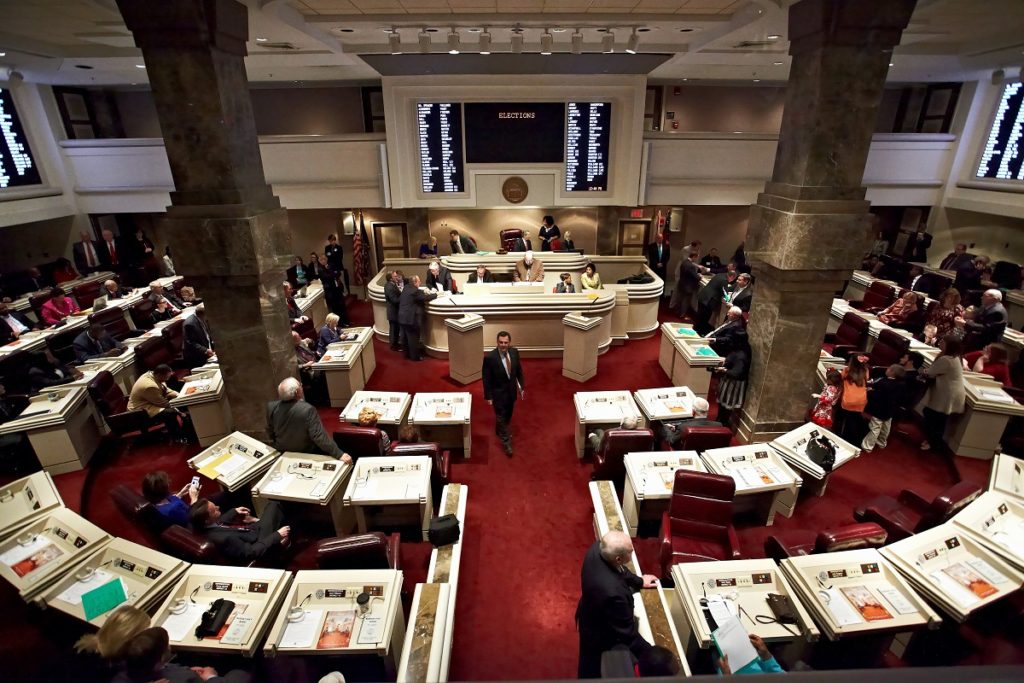
This third year of the quadrennium Regular Session of the legislature has recently gotten a lot more complex. These next four months will be trying times for the Alabama Legislature. They will not only have to deal with a beleaguered General Fund Budget that has to feed a money-eating monster named Medicaid, they have an overcrowding problem in the state prisons to deal with as well as major public school systems being taken over by the state because of mismanagement and underfunding. They now have been dealt a body blow that affects their own backyards. They will have to draw new legislative lines that will need to be in effect by June because legislative elections essentially begin this June. The primaries for 2018 political offices will be held in early June next year. All 105 House seats and all 35 Senate seats are up for election. The bell rings this June 6 for all state races to begin raising money. Folks, money is the mother’s milk of politics. It usually determines who wins a race. Campaign money equates into name identification and in most legislative races it really boils down to name identification. Therefore, they will covertly make dealing with this reapportionment wrench a paramount priority. Almost five years ago, a lawsuit, which appeared at the time to be a perfunctory Hail Mary, was brought by the Alabama Legislative Black Caucus and the Alabama Democratic Conference. At the time it seemed like a vague and nebulous concept of a case. The Legislative Black Caucus and ADC argued that the Republican-controlled Legislature drew lines that moved black voters who vote Democratic into overwhelmingly populated black districts that prohibited them from forming alliances with like-minded white voters. The crux of the case, is that it diluted their influence in the legislature. The case surprisingly meandered through the courts all the way to the U.S. Supreme Court. The Supreme Court broke new ground when it even heard the case and set new precedent with its ruling. Prior to this, the Supreme Court had held a state legislature could draw lines along political paths as long as it did not discriminate against black voters. The case was remanded back to the 11th Circuit to seek a remedy. The Supreme Court sets the law. The federal judges in Alabama had to decide how to implement the ruling. When you look at the districts there is no question that the lines were drawn politically to put all black voters into almost all black districts to be represented by black Senators or black Representatives. This stacking also placed most whites in almost all white districts represented by white Senators and white Representatives. The federal judges ruled January 20, Inauguration Day, that 12 districts in Alabama must be redrawn in order to comply with the U.S. Supreme Court decision. The 2 to 1 majority of U.S. Federal Judges Keith Watkins and Bill Pryor ruled that only 12 districts were stacked. U.S. District Judge Myron Thompson wrote that he would have found 12 more districts unconstitutional. Regardless of whether 12 or 24 of the districts are out of sync, the legislative districts will have to be redrawn. When you tinker with even one district it affects the whole map. There is a ripple effect which will require redrawing most if not all of the districts in both the Senate and the House. However, the bottom line is that most of the districts in the state will change very little and more importantly it will not change the party makeup of the Legislature. You will probably have the same overwhelming Republican super majority in both chambers of the state Legislature. In Alabama politics, essentially whites are Republicans and blacks are Democrats. There is very little deviation. Therefore, the redistricting will have minimal or no partisan effect. However, long-term it lays the foundation for a possible future coalition between black Democrats and moderate Republicans to bridge a bipartisan coalition leadership. See you next week. ___ Steve Flowers is Alabama’s leading political columnist. His weekly column appears in over 60 Alabama newspapers. He served 16 years in the state Legislature. Steve may be reached at www.steveflowers.us.
Steve Flowers: Time again to focus on Alabama budgets, Medicaid problem
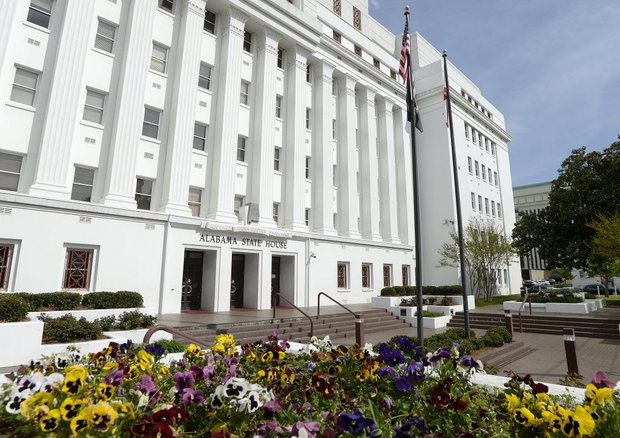
As the third regular session of this quadrennium begins, the paramount focus once again will be on the budgets. Even more specifically, it will be about the General Fund Budget. Alabama is one of five states that has two budgets. Our Education Budget now receives over two-thirds of our tax revenue due to the fact that our growth taxes, income and sales, are earmarked for Education’s coffers, whereas our General Fund gets the remaining one-third of revenue and that will continue to shrink because it has no growth taxes. The General Fund also has to feed the most expensive expenditure of state government – Medicaid. This Great Society program created by Lyndon Johnson in the 1960s is a money eating monster that grows exponentially and now eats up over half of the General Fund Budget. This problem is not unique to Alabama. Every state would name Medicaid funding as its most significant financial nightmare. We are affected more adversely than most states because we have a much higher indigent population. It is this long-term problem that eventually will have to be addressed. Those who are closest to the problem are aware that it is an elephant in the room that will not go away. Rep. Steve Clouse (R-Ozark), who chairs the House Ways and Means General Fund Committee, sees it as does Gov. Robert Bentley. Governor Bentley, being a former physician, is sympathetic to the needs of the less fortunate. He treated all patients during his 35 years of practicing medicine. He also wants to see his compatriot pediatricians paid to take care of poor sick children. Initially many of the Republican House and Senate members were saying enough is enough. We cannot continue to absorb 10 percent annual increases in this social program, even if the federal government matches Alabama’s contribution about three to one. However, once a crisis seemed imminent, they realized that it not only affected the poor but also the middle-class Alabamians they represent. In medium sized towns and cities throughout the state it is imperative that Medicaid be funded in order for their hospitals to exist. In Birmingham, it would cripple our crown jewel, Children’s Hospital. It would also be devastating for Alabama’s and Birmingham’s largest employer, UAB. Most respected economists say that Alabama should have taken the Expanded Medicaid Program offered by the federal government. It would have been a financial boon for that state if for nothing else than the windfall to UAB. A good many of the Republican legislators’ constituents rely on Medicaid to care for their parents and family members and probably a good many of their parents reside in nursing homes. Approximately 70 percent of nursing home residents in the state depend on Medicaid to pay their nursing home expenses, which by the way is very expensive. In short, Medicaid is here to stay. It is not going away. Legislators cannot bury their head in the sand like an ostrich and hope the problem disappears. The legislature and governor have come up with a short-term fix to our Medicaid problem. They appropriated $120 million of the one-time BP oil spill settlement funds and gave it to Medicaid. This was about 20 percent of the one-time BP windfall. Ironically, it will be disbursed over the next two years, 2017-2018. Guess what folks – that is when the quadrennium ends. Therefore, the proverbial can has been kicked down the road. The next governor and legislature will inherit this baby to take care of the following four years. Legislators may be faced with yet another issue in this overladen regular session. It may be imminent to raise the gasoline tax in the state, which has not been increased in 15 years. The reason being is that the Trump administration will probably come with a massive federal infrastructure plan to rebuild the nation’s highways and bridges. More than likely states will have to come up with some matching dollars. It will be imperative that we take advantage of this once in a lifetime opportunity. The last major federal highway initiative was the Eisenhower Federal Interstate Program. We are behind the eight ball when it comes to political capital and attaining federal dollars. Governor Bentley is blackballed and laughed at by the Trump administration, as are our Congresswomen Martha Roby and Terri Sewell. We also have a freshman Senator who will be ranked 100th in seniority. However, we have quite an ace in the hole. We have Richard Shelby to protect us. When Shelby speaks, folks in Washington listen and that includes Trump. Richard Shelby is unquestionably one of the five most powerful members of the U.S. Senate. See you next week. ___ Steve Flowers is Alabama’s leading political columnist. His weekly column appears in over 60 Alabama newspapers. He served 16 years in the state Legislature. Steve may be reached at www.steveflowers.us.
Medicaid commissioner: Alabama at ‘crossroads’ on Medicaid managed care switch

Medicaid Commissioner Stephanie Azar said Monday that the state is at a “crossroads” over whether to continue a proposed switch to managed care. Since 2013, Alabama has been working on a plan to shift some of the state’s 1 million Medicaid patients to managed care provided by Regional Care Organizations. The state pushed back implementation until Oct. 1 because of uncertainty over funding. Azar said federal Medicaid officials will withdraw the waiver if the state does not implement the regional care program by October. “We are at crossroads at the program. We can’t implement it any farther than Oct. 1. and funding, obviously, remains an issue for the program and our Medicaid program in general,” Azar said. Lawmakers approved the shift to managed care in the hopes that it would slow the growth of Medicaid expenses. She said the state Medicaid program will need an increase of about $44 million in the budget lawmakers will begin writing in the session that begins next week. Azar said she did not know what changes the Trump administration will being to Medicaid. “We don’t know what we don’t know,” she said. However, Azar cautioned that the state needs to play a role in any block grant design to make sure the state doesn’t end off “worse off.” Lawmakers used oil spill settlement funds to patch together Medicaid’s budget in 2017 and 2018. Azar said the money was a “god send” for the program. However, she said Medicaid faces a “train wreck” in 2019 without new revenue. Republished with permission of The Associated Press.
Donald Trump action on health care could cost Planned Parenthood
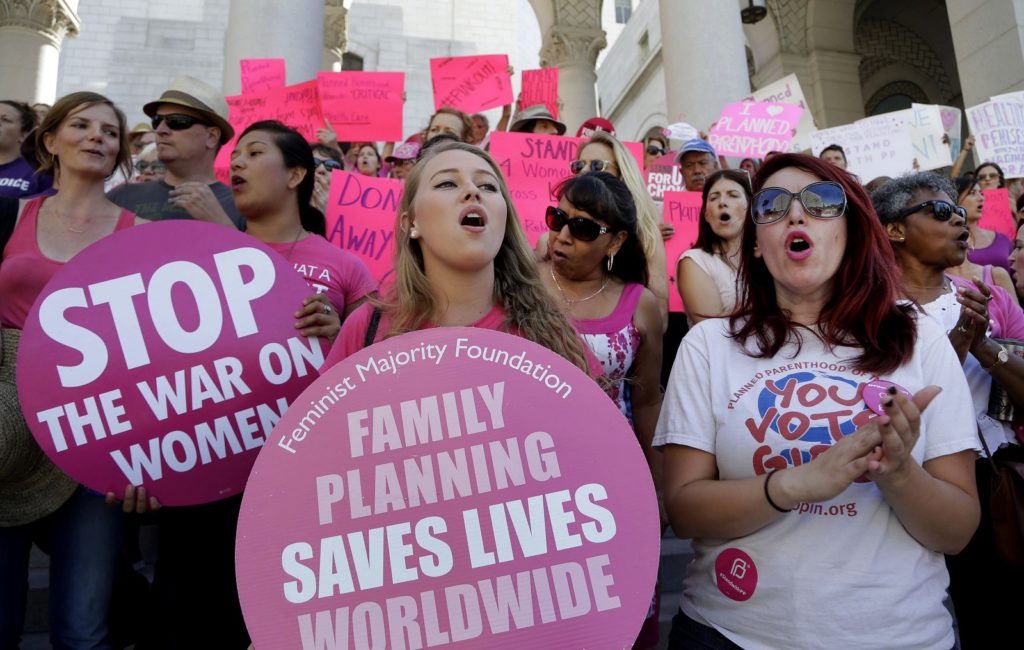
One of President-elect Donald Trump‘s first, and defining, acts next year could come on Republican legislation to cut off taxpayer money from Planned Parenthood. Trump sent mixed signals during the campaign about the 100-year-old organization, which provides birth control, abortions and various women’s health services. He said “millions of women are helped by Planned Parenthood,” but he also endorsed efforts to defund it. Trump once described himself as “very pro-choice.” Now he’s in the anti-abortion camp. Still, the Republican has been steadfast in calling for repeal of President Barack Obama‘s health care law, and the GOP-led Congress is eager to comply. One of the first pieces of legislation will be a repeal measure that’s paired with cutting off money for Planned Parenthood. While the GOP may delay the impact of scuttling the law for almost four years, denying Planned Parenthood roughly $400 million in Medicaid funds would take effect immediately. “We’ve already shown what we believe with respect to funding of Planned Parenthood,” House Speaker Paul Ryan, R-Wis., told reporters last month. “Our position has not changed.” Legislation to both repeal the law and cut Planned Parenthood funds for services to low-income women moved through Congress along party lines last year. Obama vetoed it; Trump’s win removes any obstacle. Cutting off Planned Parenthood from taxpayer money is a long-sought dream of social conservatives, but it’s a loser in the minds of some GOP strategists. Planned Parenthood is loathed by anti-abortion activists who are the backbone of the GOP coalition. Polls, however, show that the group is favorably viewed by a sizable majority of Americans — 59 percent in a Gallup survey last year, including more than one-third of Republicans. “Defunding Planned Parenthood as one of their first acts in the new year would be devastating for millions of families and a huge mistake by Republicans,” said incoming Senate Minority Leader Chuck Schumer, D-N.Y. Democrats pledge to defend the group, and they point to the issue of birth control and women’s health as helping them win Senate races in New Hampshire and Nevada this year. They argue that Trump would be leading off with a political loser. But if he were to have second thoughts and if the Planned Parenthood provision were to be dropped from the health law repeal, then social conservatives probably would erupt. “They may well be able to succeed, but the women of America are going to know what that means,” said Rep. Diana DeGette, D-Colo., citing reduced access to services Planned Parenthood clinics provide. “And we’re going to call Republicans on the carpet for that.” At least one Republican senator, Susan Collins of Maine, may oppose the effort. Collins has defended Planned Parenthood, saying it “provides important family planning, cancer screening and basic preventive health care services to millions of women across the country.” She voted against the health overhaul repeal last year as a result. Continued opposition from Collins, which appears likely, would put the repeal measure on a knife’s edge in the Senate, where Republicans will have a 52-48 majority next year. Senate GOP leaders could afford to lose just one other Republican. Anti-abortion conservatives have long tried to cut Planned Parenthood funds, arguing that reimbursements for nonabortion services such as gynecological exams help subsidize abortions. Though Planned Parenthood says it performed 324,000 abortions in 2014, the most recent year tallied, the vast majority of women seek out contraception, testing and treatment of sexually transmitted diseases, and other services including cancer screenings. The drive against Planned Parenthood picked up steam in 2015 after an anti-abortion group called the Center for Medical Progress released secretly-recorded videos that it claimed showed Planned Parenthood officials profiting from sales of fetal tissue for medical research. The measure, however, would strip Planned Parenthood’s Medicaid funding for only a year, a step taken to give time for continued investigations of Planned Parenthood’s activities. A House panel is still active, but investigations by 13 states have been concluded without charges of wrongdoing. Planned Parenthood strongly denied the allegations and no wrongdoing was proved, but the group announced in October that it will no longer accept reimbursement for the costs involved in providing fetal tissue to researchers. The defunding measure would take away roughly $400 million in Medicaid money from the group in the year after enactment, according to the nonpartisan Congressional Budget Office, and would result in roughly 400,000 women losing access to care. One factor is that being enrolled in Medicaid doesn’t guarantee access to a doctor, so women denied Medicaid services from Planned Parenthood may not be able to find replacement care. Planned Parenthood says private contributions are way up since the election, but that they are not a permanent replacement for federal reimbursements. “We’re going to fight like hell to make sure our doors stay open,” said Planned Parenthood spokeswoman Erica Sackin. Republished with permission of The Associated Press.
Poll: Only about 1 in 4 wants Donald Trump to repeal health law

Only about one in four Americans wants President-elect Donald Trump to entirely repeal his predecessor’s health care law that extended coverage to millions, a new poll has found. The postelection survey released Thursday by the nonpartisan Kaiser Family Foundation also found hints of a pragmatic shift among some Republican foes of “Obamacare.” While 52 percent of Republicans say they want the law completely repealed, that share is down from 69 percent just last month, before the election. And more Republicans now say they want the law “scaled back” under the new president and GOP Congress, with that share more than doubling from 11 percent before the election to 24 percent after. Kaiser CEO Drew Altman said the foundation’s polling experts aren’t quite sure what to make of that finding, and will continue to track the apparent shift in future polls. The organization is a clearinghouse for information and analysis about the health care system. It could be that some Republicans “got a protest vote off their chests, and they’re done with that,” Altman said. “They now have a more moderate position.” After branding the Affordable Care Act a “disaster” during an election campaign that saw big premium hikes unveiled in its closing days, Trump has been saying he’d like to keep parts of the law. On Capitol Hill, Republican leaders are trying to choreograph a legislative dance that would let them quickly repeal “Obamacare,” then allow an interlude to segue to a replacement. The complex undertaking is fraught with political risk, because success is not guaranteed. It could disrupt coverage for millions by destabilizing the law’s already fragile health insurance markets, such as HealthCare.gov. The poll found some skepticism about that approach. Forty-two percent of those who want the 2010 health care law repealed said lawmakers should wait until they figure out the details of a replacement plan before doing so. Americans were divided on next steps for President Barack Obama‘s signature law. Overall, 30 percent said the new president and Congress should expand what the law does, and another 19 percent said it should be implemented as is. On the other side, 26 percent said the law should be entirely repealed and 17 percent called for it to be scaled back. Among Trump voters, 8 in 10 viewed the health care law unfavorably, and half wanted it entirely repealed. As Republicans start to make changes in health care, potentially revamping Medicare and Medicaid as well, the politics of the issue could turn against them, Altman said. “They are going to go from casting stones to owning the problem,” he said. The poll found majorities across party lines support many of the health care law’s provisions, but not its requirement that individuals have coverage or risk fines, and its mandate that medium-to-large employers pay fines if they don’t offer health insurance. Among the provisions with support across party lines: — Allowing young adults to stay on a parent’s insurance until age 26. — No co-payments for many preventive services. — Closing the Medicare prescription drug coverage gap known as the “doughnut hole.” — Financial help for low- and moderate-income people to pay their insurance premiums. — A state option to expand Medicaid to cover more low-income adults. — Barring insurance companies from denying coverage because of a person’s medical history. — Increased Medicare payroll taxes for upper-income earners. The telephone poll was conducted from Nov. 15-21 among a nationally representative random digit dial sample of 1,202 adults, including people reached by landlines and cellphones. The margin of sampling error is plus or minus 3 percentage points for the full sample. For subgroups, the margin of sampling error may be higher. Republished with permission of The Associated Press.
State Auditor Jim Zeigler asks panel to delay $8M contract for Medicaid RCOs

Alabama State Auditor Jim Zeigler is asking for yet another Medicaid contract delay. On Tuesday, Zeigler asked the Alabama Legislature’s Contract Review Committee to delay a contract for $8 million in consulting services for implementation of the regional care organizations (RCOs) to deliver Medicaid healthcare. Zeigler said the contract needs to be scrapped, and has filed a written request for the maximum delay of 45 days to allow such action. “This huge consulting cost needs substantial review by all in authority,” Zeigler explained of his request. “A contract of this size does not need to be approved and should be scrutinized and scrapped.” Medicaid is seeking to pay $8 million to the Chicago firm of Navigant Consulting for implementing the new system of private providers in each area of Alabama instead of the present statewide administration by the state Medicaid agency. Zeigler continued, “It appears that the plan for regional care organizations as now formatted will cost the state millions instead of saving the state millions. This plan needs to be halted now, before millions are spent in the implementation stage. Approval of this contract would be throwing good money in front of bad.” Designed to be the state’s solution to the perennial problem of rising costs of Medicaid, RCOs have become a controversial topic in the Yellowhammer State this year. Last month, Zeigler filed a separate request for another delay of a controversial $1.3 million contract. The Committee approved the request for delay. The review panel will meet Thursday, Nov. 3 at 1 p.m. to review proposed contracts from state agencies, and will consider Zeigler’s request then. Below is a copy of Zeigler’s Nov. 1 request to the Contract Review Committee:

